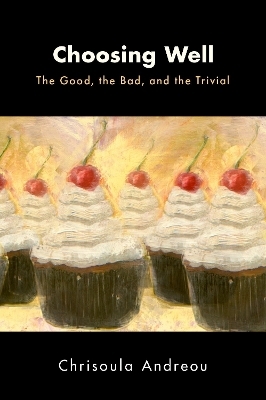
Choosing Well
Oxford University Press Inc (Verlag)
978-0-19-758413-2 (ISBN)
Self-defeating behavior and the damage it can cause constitute a rich and intriguing area of philosophical inquiry. Choosing Well explores the challenges associated with effective choice over time from both theoretical and practical perspectives. Andreou focuses on the challenges raised by cyclic preferences and incomplete preferences, both of which interfere with our ability to neatly order our options and thus make us susceptible to self-defeating patterns of choice which in turn create unacceptable results.
What are we to do if we find ourselves with cyclic preferences or with incomplete preferences? Do such preferences make us irrational? Andreou argues that rationality does not invariably prohibit disorderly preferences but does prompt us to proceed with caution when preferences are disorderly. Theories of rational choice often dismiss or abstract away from the sorts of disorderly preferences that Andreou focuses on, since they assume that rational agents can and should have neat preferences over their options. Instead, Andreou suggests, rationality can validate certain disorderly preference structures while also protecting us from self-defeating patterns of choice.
Chrisoula Andreou is a Professor in the Philosophy Department at the University of Utah and an Executive Editor of the Canadian Journal of Philosophy. Her current research projects lie in the areas of Practical Reasoning, Action Theory, Ethical Theory, and Applied Ethics.
Preface
Introduction
Chapter 1: Disorderly Preferences
1.1 Cyclic Preferences, the Money-Pump Argument, and the Puzzle of the Self-Torturer
1.2 Incomplete Preferences, Incommensurable Alternatives, and the Small-Improvement Argument
Chapter 2: Self-Defeating Self-Governance
2.1 Self-Governance
2.2 Self-Defeating Behavior
2.3 The Satisfied Slice
2.4 Strictly Self-Defeating Behavior
2.5 A Complication
2.6 Conclusion
Chapter 3: Instrumental Rationality Revamped
3.1 A Puzzle about the Puzzle of the Self-Torturer
3.2 The Real Puzzle of the Self-Torturer
3.3 Rational Dilemmas
3.4 The Moral Regarding Instrumental Rationality
3.5 Making Sense of the Money-Pump Argument
Chapter 4: Parity
4.1 Parity Illuminated
4.2 Objections and Replies
4.3 Insignificant and Momentous Choices
4.4 Generalizing
4.5 Parity without Rough Equality
4.6 Conclusion
Chapter 5: Incomparability
5.1 Incomparability and the Huge-Improvement Arguments
5.2 A Complication
5.3 Conclusion
Chapter 6: Betterness
6.1 "Is Better Than" Versus "Is Rationally Preferred To"
6.2 League-Based Satisficing
6.3 In Defense of Divergence
6.4 Morally Better Than
6.5 Conclusion
Chapter 7: Resolutions and Regret upon Going Astray
7.1 Planning Agency and the No-Regret Condition
7.2 What's to Regret?
7.3 No Regrets
7.4 Conclusion
Chapter 8: Regret in Continued Endorsement Cases
8.1 Regret, Monism, and Pluralism about the Good
8.2 From Buttered Bagels to "EverBetter" Wine and Ever-So-Tempting Potato Chips
Conclusion
| Erscheinungsdatum | 25.01.2023 |
|---|---|
| Verlagsort | New York |
| Sprache | englisch |
| Maße | 212 x 147 mm |
| Gewicht | 358 g |
| Themenwelt | Geisteswissenschaften ► Philosophie ► Ethik |
| ISBN-10 | 0-19-758413-6 / 0197584136 |
| ISBN-13 | 978-0-19-758413-2 / 9780197584132 |
| Zustand | Neuware |
| Informationen gemäß Produktsicherheitsverordnung (GPSR) | |
| Haben Sie eine Frage zum Produkt? |
aus dem Bereich


